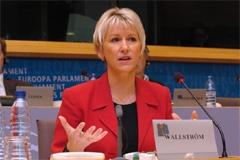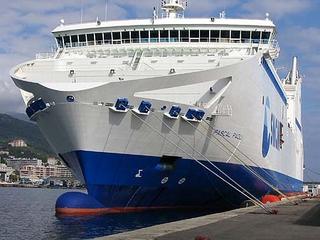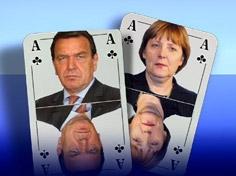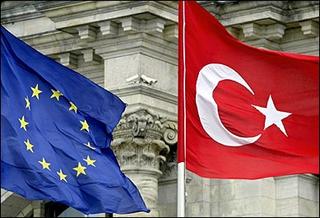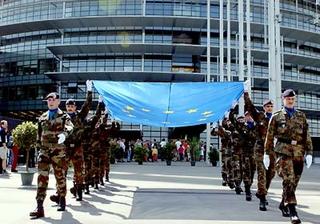
A certain amount of excitement has been generated by the recent decision by the Court of First Instance, which according to Matthias Storme of the
Brussels Journal “undermines the rule of law and the principles of the constitutional state and of democracy.”
Since, according to the same writer, the ruling says
“that decisions of the United Nations Security Council take precedence over national constitutions, European law and even the European Convention for the Protection of Human Rights and Fundamental Freedoms (ECHR).”,
one cannot help doubting the seriousness of the problem.
Anyone who thinks that it is horrifying that a decision should take precedence over “even” the ECHR does not necessarily understand the basic concept of the rule of law or of the “principles of the constitutional state and of democracy”. The fact is that the ECHR in itself undermines those principles and, indeed, the rule of law.
The decision was taken over the case of Ahmed Yusuf Ali, a Swedish citizen of Arab origin. His name appeared in 2001 on a list of persons suspected of being linked to terrorist organizations. In particular, he ran a money-transfer facility for Somalis world-wide and there is more than a hint of a suspicion that this was used to transfer money to terrorist organizations.
The list was established by the UN Security Council and transferred into EU law immediately, though, as it happens, this would come under Pillar 3, that is inter-governmental agreement.
Yusuf Ali’s assets were frozen by the Swedish authorities, who are also bound to respect the decision of the UN Security Council. However, he and his lawyer Thomas Olsson, decided to appeal against the EU decision.
The argument was two-fold: in the first place, Mr Yusuf Ali argued that EU legislation cannot apply to individuals – a dubious proposition since EU legislation in this case taking the form of several Regulations, which are directly applicable, works through that of the member states and that can and does apply to individuals.
The second point was probably more valid: Mr Yusuf Ali and Mr Olsson argued that he had not been allowed to defend himself in a court of law, which, they ought to have stated, is against the principles of natural justice and the rule of law. But they did not say this. It was, they argued, against the European Charter of Human Rights, an unsatisfactory transnational document that can be used to over-rule the democratically enacted legislation of supposedly sovereign states.
Matthias Storme finds the whole idea horrifying:
“Though terrorism should be combated by the international community, Wednesday’s verdict effectively implies that decisions of the Politburo of the Chinese Communist Party can gain precedence over the European Human Rights Convention. China is a member of the Security Council and its position can determine the outcome of Security Council decisions. What is the value of “human rights” which in the hierarchy of values rank lower than the preferences of the Chinese CP.”
That was, of course, the argument used by those who opposed the United States going to the UN before invading Iraq. Then it was valid. In the case of the European Human Rights Convention, it is less so. The ECHR is a document of the Council of Europe, whose members nowadays include Azerbaijan, Ukraine, Russia and all the former member states of Yugoslavia. Their judges sit on the European Court of Human Rights. Not China, perhaps, but hardly people one would go to for guidance on the rule of law and democracy.
The Court decision, as is usual, lists all the various Security Council Resolutions and the treaty articles related to the common foreign and security policy:
In accordance with Article 11(1) TEU:
The Union shall define and implement a common foreign and security policy covering all areas of foreign and security policy, the objectives of which shall be: – to safeguard the common values, fundamental interests, independence and integrity of the Union in conformity with the principles of the United Nations Charter, – to strengthen the security of the Union in all ways, – to preserve peace and strengthen international security, in accordance with the principles of the United Nations Charter …” Sad but true. We have all signed up to this. (Well, our governments have on our behalf and I do not suppose that many Swedish lawyers protested at the time.) And the role of the European Union courts is to ensure that the treaties are complied with and European integration proceeds apace.
Much of the
debate seemed to revolve round the question whether the Regulation in question went beyond EC rules, which can impose sanctions on third countries. The court upheld the argument that sanctions can be imposed on individuals and organizations in order to interrupt their economic dealings with third countries. In this case, the third country was Afghanistan, at that point the home of the Taliban and Osama bin Laden (wherever he may be now). Therefore, EC rules were not breached.
The debated part of the decision that concerns the question of legal supremacy is stated in the
press release of the Court of First Instance:
“The Court of First Instance finds that, according to international law, the obligations of the Member States of the United Nations under the Charter of the United Nations prevail over any other obligation, including their obligations under the European Convention for the Protection of Human Rights and Fundamental Freedoms and under the EC Treaty. This paramountcy extends to decisions of the Security Council.
Although it is not a member of the United Nations, the Community must also be considered to be bound by the obligations flowing from the Charter of the United Nations, in the same way as are its Member States, by virtue of the Treaty establishing it. First, the Community may not infringe the obligations imposed on its Member States by virtue of the Charter or impede their performance. Second, it is required to adopt all the provisions necessary to allow its Member States to fulfil those obligations.”
The debate is, therefore, about the supremacy of UN or EC legislation. The member states come into it only as entities that are obliged to fulfil one or the other. Democracy and rule of law have nothing to do with any of this. What we are witnessing is a fight between two transnational organizations (known not so affectionately as
tranzis) for supremacy.
Once we have acknowledged that one transnational organization (be that the Council of Europe or the European Union) has supremacy over our own laws, enacted within our own consitutional structure and accountable to the people of this country, the idea that the UN has supremacy over them is not that shocking.
The freezing of assets of criminals and suspected criminals (the financing of terrorism is a criminal offence in the UK and most other countries) may be an arguable piece of legislation but is, in fact, there in British law.
As long as we remain part of the UN (and Sweden is, as well as the UK) we are supposedly bound by the Security Council decisions. But the legislation, in this case, is EU legislation implemented by the Member States. And that is non-negotiable, until such time as we or Sweden decide to become independent sovereign states.
I imagine, even after that there will be legislation to deal with terrorists and those who finance them.
COMMENT THREAD


